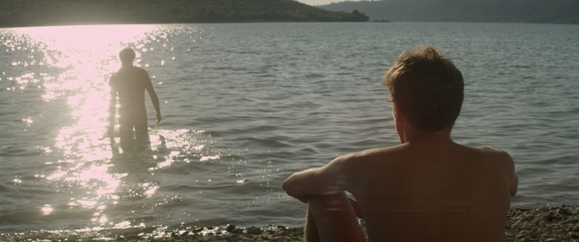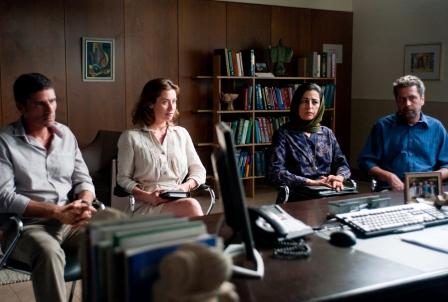
For all sorts of reasons, Stranger by the Lake will not be everyone’s cup of tea. That’s a shame, because it is a willfully unsettling, quite disturbing meditation about the mores and morals allowed to evolve in a vacuum. What one needs to keep in mind is that it is a bit short on plot: there is a story of sorts, an erotic murder-mystery, but because we know the whodunit from the start, the one thing that holds our attention from this perspective is the whydunit, which is a pretty enigmatic consideration. Not that this spoils the film, far from it.
A secluded lake is a cruising spot for homosexual men. It could be anywhere, and the patrons could be – in a manner of speaking are, given their anonymity – anyone. A protocol of propositioning evolves, matter of fact and consummated in near-by bushes. There are hints of relationships not based on immediate sexual attraction, of a life that extends beyond the lake, but not much more than that. The lake is a self-contained microcosm of erotic engagement, and little more beyond.
Franck, lithe and lissome and personable, strikes up a friendship with the bulky and morose Henri, who comes to the lake each day but stays apart from the fray. Henri says that he is not gay. He’s messed about with men, true. But as far as he is concerned, the number of men who are truly, exclusively homosexual are very small indeed, and he’s certainly not one of them. He’s just split up with his girl. It’s his holiday from work. And that’s about it.
Franck has eyes for Michel, but Michel is taken. C’est la vie. Then late one night, there is a murder and Franck is the only witness. He doesn’t talk: everyday life, such as it is, continues uninterrupted. But the event draws Franck and Michel and Henri into a grim, only partially consummated menage-a-trois. The murder hangs over their heads, a grim cloud that breaks when the police come nosing about and interfering with the lake’s own natural order of things.
Stranger by the Lake, a winner of the Un Certain Regard prize at this year’s Cannes Film Festival, invests a great deal in establishing a sense of place and time rather the conventionalities of plot and, up to a point, characterization. It is almost an hour before we know the name of any of the principals at all; there are almost no external reference points that one can orient oneself by. The pastoral calm by the lake is disturbed not by the sex (there is a lot of it) but rather by the oblique touches that emphasize the apartness, the disconnect, that the habitués seem to value.
When a police inspector, trying to get to the bottom of the murder, accuses Franck – and by extension, the whole community, such as it is – of valuing the simulacrum of normality, their freedom over the death of “one of (their) own,” it is rather uncomfortable to acknowledge that he has a point. And more uncomfortable, by this point, to understand why they might want it so. Stranger by the Lake, emotionally abbreviated though it is, is an unsettling film.
Generally, the simplest taxonomy of cinema is to split films into those concerned with evoking mood and those that try to tell a story. Strangers by the Lake is very much of the first category. The Other Son, on the other hand, firmly and with foresight places itself within the latter. It sticks very much to crafting a particular type of narrative, even at the expense of leaving unexplored less tangible but possibly more rewarding attitudes untested.

The story of children swapped at birth is old as the hills. The topical twist here is that the hills in question are the Judean hills, the two protagonists 18 year olds on the two sides of the intractable Israeli-Palestinian divide: Joseph, the son of a career army officer looking forward to military service in the Air Force and Yassin, from modest surroundings in the West Bank but fortunate enough to have secured a scholarship to study in Paris.
Writer/director Lorraine Levy makes the very conscious decision from the start to concentrate on the human aspect of the story, on the consequences for the two boys (Jules Sitruk and Mehdi Debhi) and their families after the mix-up is discovered. The narrative is solid rather than spectacular, and contains few surprises: the two mothers, played by Emmanuelle Devos and Areen Omari, try to find ways to build bridges between the two families whose destinies have been linked by fate. There is palpable anxiety of what the respective social milieus will make of the swap, once the secret is out; the two fathers (Pascal Elbe and Khalifa Natour) glower at each other rather ineffectually. The Other Son negotiates the trickier aspects of the dysfunctional relationship between Israel and Palestine plausibly, the necessity of cliché only slightly veering into stereotype. It isn’t sugar coated kumbaya stuff at all, but it isn’t terribly political either. But that isn’t actually a bad thing, come to think of it. I do think it is telling though that in their own way, neither Joseph nor Yassin saw their future as being particularly rooted in mainstream Palestine and Israel, even before the complications of identity arose. Even so, it is a hopeful – if not wholly optimistic – film, which does what it sets out to do competently. I happen to think that exploring the mise en scene that feeds into such a perplexing state of affairs – what does it mean to be a Jew, for instance, or a Palestinian – might have made for a more interesting, if less complete film. But as a work of story-telling fiction, it is sound enough.
Stranger by the Lake (2013)
Written and Directed by Alain Guiraudie
Starring Pierre Deladonchamps, Christophe Paou, Patrick d’Assumcao
100 minutes, French with Hebrew and English subtitles
The Other Son
Written and Directed by Lorraine Levy
Starring Emmanuelle Devos, Pascal Elbe, Mehdi Debhi, Aneen Omari, Jules Sitruk, Khalifa Natour
105 minutes, French, Hebrew, Arabic and English with Hebrew and English subtitles





